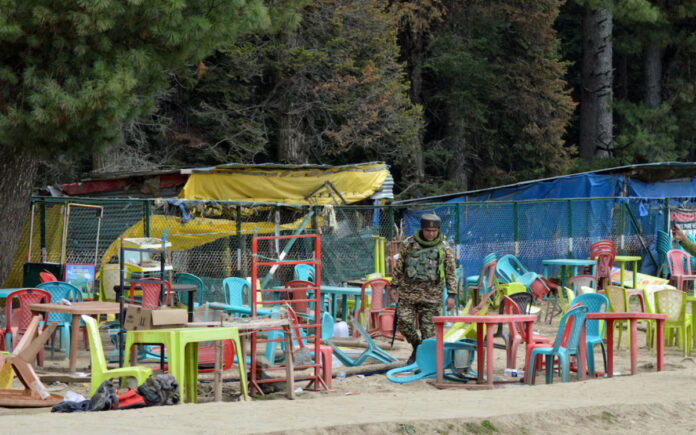Islamabad/Srinagar: Pakistan has closed its airspace to Indian airlines and rejected New Delhi’s suspension of a critical water-sharing agreement as tensions between the two nuclear-armed neighbors reached a new low. These retaliatory actions came after a deadly Islamist militant attack on tourists in Indian Kashmir, which claimed the lives of 26 people.
The escalating diplomatic crisis follows Tuesday’s attack in the Pahalgam region of Kashmir, the deadliest assault on civilians in India since the 2008 Mumbai attacks. The attack led India to accuse Pakistan-based elements of involvement, though New Delhi has yet to present any evidence or details. In response, India downgraded diplomatic relations by suspending the 1960 Indus Waters Treaty, which governs the sharing of water between the two countries, and closing the only land crossing between India and Pakistan.
On Thursday, Pakistan responded by closing its airspace to all Indian-owned or operated airlines, halting trade, including through third-party countries, and suspending special South Asian visas issued to Indian nationals. Additionally, Pakistan’s Prime Minister’s office announced that it would suspend all bilateral agreements with India, including the 1972 Simla Agreement, until New Delhi ceases “fomenting terrorism inside Pakistan.” The Simla Agreement, signed after the third war between the two countries, sets out principles for bilateral relations, including respect for the Kashmir ceasefire line.
Pakistan’s announcement was met with no immediate response from New Delhi. Meanwhile, Pakistan’s dollar-denominated government bonds saw a sharp drop of more than 4 cents as the tensions deepened.
The Kashmir region, claimed by both India and Pakistan in full but each controlling part, remains the focal point of their longstanding animosity. The area has witnessed two of their three wars and a bloody insurgency against Indian rule.
Pakistan also strongly rejected India’s suspension of the Indus Waters Treaty, warning that any attempt to stop or divert water flowing to Pakistan would be considered an “act of war” and would be met with a full response using the nation’s complete spectrum of power. The treaty, which was mediated by the World Bank, has survived even periods of conflict, but now, Pakistan fears India’s suspension could deprive it of vital water resources used for hydropower and irrigation.
Also Read | Trump Urges Putin to ‘STOP’ After Deadly Russian Missile Strike on Kyiv
Indian Prime Minister Narendra Modi’s response came just hours before Pakistan’s announcement. In a public speech, Modi vowed to track down and punish the militants responsible for the deadly attack on the tourists. He addressed a crowd in Bihar, urging them to join him in a prayer for the victims. “We will pursue them to the ends of the earth,” he said, though without directly naming Pakistan or identifying the attackers. “They have made the mistake of attacking the soul of India. I want to say clearly, that those who have planned and carried out this attack will be punished beyond their imagination,” Modi declared to loud applause from the crowd.
Simultaneously, the Indian Ministry of External Affairs announced the suspension of all visa services to Pakistanis and the revocation of previously issued visas.
Also Read | Peru’s Caral Civilization Yields Tomb of Elite Woman from 3000 B.C.
Diplomatic ties between the two countries had already been strained prior to this latest crisis. Pakistan had expelled India’s envoy, and India had revoked the semi-autonomous status of Jammu and Kashmir in 2019, leading to a further breakdown in relations.
The deadly attack has now become a significant setback for Modi and his Bharatiya Janata Party’s long-held narrative that the revocation of Kashmir’s special status would lead to peace and development in the region. India has long accused Pakistan of supporting the insurgency in Kashmir, though Pakistan insists it only offers diplomatic and moral support to those seeking self-determination.
Since the uprising began in 1989, tens of thousands have lost their lives in Kashmir, but recent years have seen a decline in violence, and tourism has seen a resurgence in the region.



